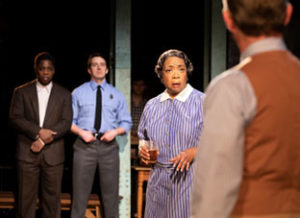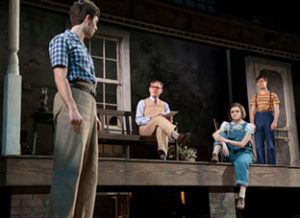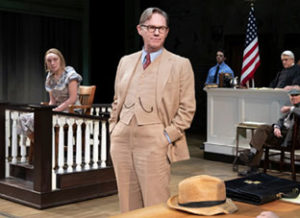Emotionally charged adaptation of ‘To Kill a Mockingbird’ hits Broadway San Diego for a limited run
“A mob’s a place where people go to take a break from their conscience.” “I was guilty as soon as I was accused.” “How much time would Maycomb like? Helen Robinson was asking.” The hits just keep coming as To Kill a Mockingbird, currently stopping in San Diego on tour for the next few days, refuses to shy away from packing the punches.
Mockingbird certainly has the ethos to do so. The original Pulitzer Prize-winning novel, penned by Harper Lee, is an American institution of its own. A staple in many classrooms while also appearing concurrently on many banned book lists, it is a coming-of-age story of children watching their small-town lawyer father defend a Black man unjustly accused of a crime. There are few unfamiliar with Scout, Jem, and Atticus Finch, Tom Robinson, Calpurnia, and Boo Radley. This adaptation by Aaron Sorkin and directed by Bartlett Sher, however, is not the To Kill a Mockingbird you remember.

Yaegel T. Welch (“Tom Robinson”), Stephen Elrod, Jacqueline Williams (“Calpurnia”) and Richard Thomas (“Atticus Finch”). Photo by Julieta Cervantes.
At the center of the story, still, is goodhearted widower/lawyer Atticus Finch (Richard Thomas), a man who endeavors to raise his children with dignity and a sense of responsibility for doing what is right. As the play progresses, Atticus interacts with his friends, neighbors, colleagues, and family cook, Calpurnia (Jacqueline Williams), while he prepares to serve as defense lawyer to Tom Robinson (Yaegel T. Welch). Robinson stands unjustly accused of raping and beating a farmer’s daughter, Mayella Ewell (Arianna Gayle Stucki), but the real truth is much more simple: he is Black in 1930s Alabama. Racial disparity is prevalent, socioeconomic woes and instability have community members on their toes, and Robinson simply cannot be innocent, after all, if Bob Ewell (Joey Collins) says it is so. After all, he has plenty of lynching rope to prove it.
That said, from the moment that the play kicks off with fourth-wall breaking narration by Scout (Melanie Moore), Jem (Justin Mark), and their friend Dill (Steven Lee Johnson), it is immediately apparent that Sorkin’s first order of business has been to flip the chronology on its head.

(L to R) Justin Mark (“Jem Finch”), Richard Thomas (“Atticus Finch”), Melanie Moore (“Scout Finch”) and Steven Lee Johnson (“Dill Harris”). Photo by Julieta Cervantes.
Toggling back and forth between the trial and the preceding events, while a bold choice, is one that pays off. In many ways, redistributing the lengthy contextual work typically gathered in the first half of Lee’s book allows a rejuvenation of the story for the stage. The history is still there – it’s simply delivered as needed, interspersed with convivial recollections of growing up, increasingly tense courtroom scenes, and expanded character development for Calpurnia and Robinson, set to an eerie organ and hymnal original score by Adam Guettel, and housed in an inventive and malleable setting of flying and hand-moved pieces (Miriam Buether).
These elements combine to make a production that is jarring, elegant, passionate, and devastating in turn. The two dozen outstanding actors know where their moments are and apply pressure accordingly in counterpoint to one another. Scout, Jem, and Dill, played interestingly by adult actors, are as yet childlike in their simplicity. Moore wears precociousness like she is born to it, capturing Scout’s inquisitive nature. This appears alongside Mark’s courage as Jem and Johnson’s hopeful innocence as Dill. Collins, as Bob Ewell, carries smarminess and hatred in such a way that it seeps out of his walk and just can’t help but escape his lips. Stucki, playing his daughter Mayella, is stunning as she detonates on stage, parroting the bigoted words that her father spewed just scenes before. In contrast, Welch bears a quiet dignity as Robinson and Williams brings just the perfect degree of passive aggression and sense of justice to Calpurnia.

(L to R) Arianna Gayle Stucki (“Mayella Ewell”), Richard Thomas (“Atticus Finch”), Stephen Elrod (“Bailiff”), Richard Poe (“Judge Taylor”), Greg Wood (“Mr. Roscoe”) and Joey Collins (“Bob Ewell”). Photo by Julieta Cervantes.
The audience, at the show that I attended, was aching to cheer. Spontaneous bouts of applause and gasps of approval popped up sporadically throughout the production, but never so much as when Thomas’ Atticus wheeled on the house during his closing argument: “We have to heal this wound, or it’ll never stop bleeding,” he implored, speaking of the social injustice threatening his client. “We can’t go on like this. We know this, so let’s hasten the change.” His delivery is stunning, but the reality is sobering. After all, we are 90 years older but not a day wiser.
“You’ll get used to cruelty. You’ll build up a tolerance,” claims Link Deas (Jeff Still). Hopefully the warm reception for To Kill a Mockingbird says otherwise. “All rise,” intones Scout in the final moments and, sure enough, the audience was on its feet.
To Kill a Mockingbird runs in San Diego until Dec. 4.

Cassiopeia Guthrie is a journalist, educator, and business consultant based in Southern California. Cassiopeia earned her bachelor’s in journalism at San Diego State University, an executive master’s in business administration from Quantic School of Business and Technology, and completed a training in photojournalism/storytelling for impact with National Geographic. She boasts 20 years of success in digital content development, project management, curriculum development, and business leadership across the education, media/entertainment, and communications industries, including running a scholastic journalism program as well as a social media/social PR internship program for a branding agency. Cassiopeia has 12 years of experience with nonprofit theatre management and production and is an Aubrey Award winning actress with numerous credits to her name at a variety of San Diego theaters. Cassiopeia’s writing has been seen in publications including People Magazine, Broadway World, Vista Press, City Beat, Valley Roadrunner, Escondido Times-Advocate, and others, and she has been seen discussing theatre on local television stations including CBS, NBC, ABC, and KUSI.


